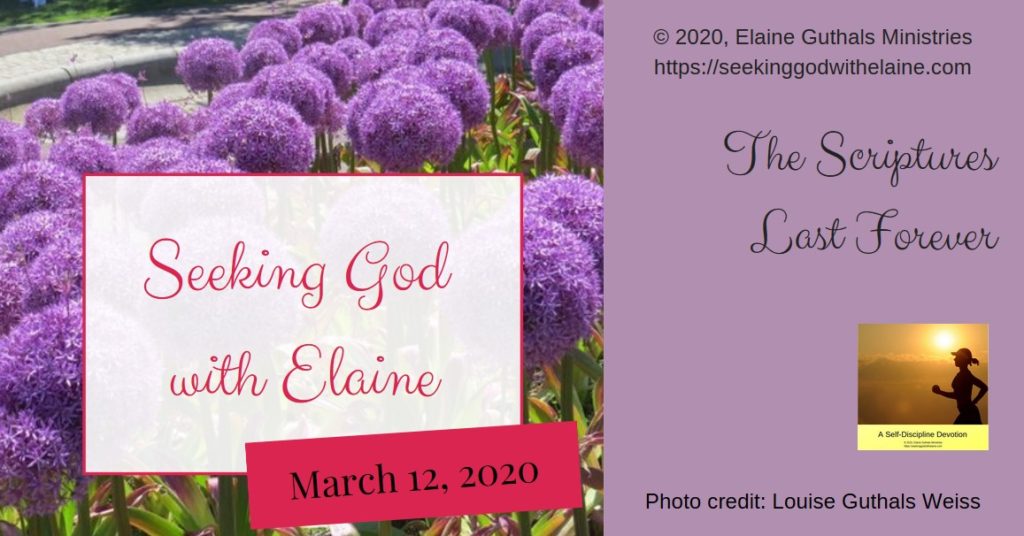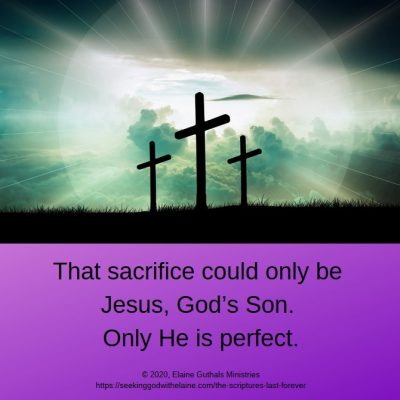It is hard for us to wrap our minds around the concept of forever. God’s Word will last for eternity. This devotion looks at what it entails in believing God’s Word lasts forever.
Nuggets
- Scriptures, as well as faith, confidence, hope, and trust, are all about the second coming.
- The “word of our God” has to mean more than just the Bible.
- Jesus’ words are not going to pass away.
Devotions in The Scriptures category
The Scriptures Last Forever

We are doing double duty in the devotions in this series. We are looking at what the Bible tells us about doctrinal issues. Then we are considering how to witness to worldview people concerning those issues.
For this devotion, we are looking at the belief that the Scriptures last forever.
Let's Put It into Context
If we are to believe that the Scriptures will last forever, then we have to believe God will live forever. We will have to believe that His dwelling place will last forever.
I know. It is hard to wrap ourselves around that at times.
It is hard when we try to consider things based on our own understanding. Remember what we said learning is. It is taking what we already know and hooking new information to it.
In this, we really do not have that base on which to hook.
We have to remember that we have to “trust in the Lord with all [our hearts], and do not rely on [our] own understanding” (Prov. 3: 5 CSB).
Scriptures Last Forever
“Lord, your word is forever; it is firmly fixed in heaven” (Ps. 119: 89 CSB)
That means we just have to take it on faith. Faith is the belief that the doctrines stated in God’s Word are true, even if we do not understand all aspects of them.
Let’s look at it this way. “Now faith is confidence in what we hope for and assurance about what we do not see” (Heb. 11: 1 NIV).
There are four words in this verse that are critical to what we believe.
Faith
The Holman Bible Dictionary defines faith as “trusting commitment of one person to another, particularly of a person to God. We get two things out of that: trust and commitment.
We’ve talked about trust before. We said that trust is believing God will do what He says He will do. We can trust Him even when we are afraid because of His unfailing love. We can trust God because He is Sovereign God — our God.
We know we can trust God — and therefore the Scriptures — because the Scriptures reflect His character. “Anyone who does not love does not know God, because God is love” (I Jn. 4: 8 ESV).
We can trust the Scriptures because of God’s power and strength. This is the Creator of the universe. This is the One who raised Jesus from the grave.
We can trust the Scriptures because of God’s truth. “God is not a man, so he does not lie. He is not human, so he does not change his mind. Has he ever spoken and failed to act? Has he ever promised and not carried it through?” (Num. 23: 19 NLT).
Confidence
Confidence, according to Merriam-Webster Dictionary, is “a feeling or consciousness of one’s powers or of reliance on one’s circumstances” and “faith or belief that one will act in a right, proper, or effective way.”
Confidence means that we put our trust into Someone because He is reliable. “Know therefore that the Lord your God is God; he is the faithful God, keeping his covenant of love to a thousand generations of those who love him and keep his commandments” (Deut. 7: 9 NIV). He has never failed us.
He may not answer our prayers in the ways we want, but “we know that all things work together for the good of those who love God, who are called according to his purpose” (Rom. 8: 28 CSB). We know His plans for us are for our good (Jer. 29: 11).
Hope
We need to really look at that last verse. “‘For I know the plans I have for you,’ declares the LORD, ‘plans to prosper you and not to harm you, plans to give you hope and a future’” (Jer. 29: 11 NIV). Do you see that? Hope.
According to the Holman Bible Dictionary, hope is the “trustful expectation, particularly with reference to the fulfillment of God’s promises.” It is back to trust, but it is more than that, in my opinion.
Hope isn’t just a now thing. It is a transference. God helped me in my spiritual tornado, so He is going to help me the next time Satan asks for me.
I see that as my decision to trust God. It is all about our decision, isn’t it? God gives us free will to decide whether we are going to submit to Him or not.
We have to believe it is God protecting us in our spiritual tornadoes so we can believe that He is in control of all that comes.
Assurance
Assurance, as opposed to hope, comes from God.
Oh, that is interesting. The Holman Bible Dictionary took me, when I went to assurance, to see security of the believer.
The security of the believer is “biblical teaching that God protects believers for the completion of their salvation.”
That is what faith, confidence, hope, and trust is all about. More, this is what the Scriptures are all about.
“For God so loved the world that he gave his one and only Son, that whoever believes in him shall not perish but have eternal life” (Jn. 3: 16 NIV).
God loves us so much that He didn’t want to be separated from us for eternity. He didn’t want us to face the consequences of sin throughout eternity.
Because of this, God looked for payment for the penalty of sin. That payment had to be made with blood. But not just any blood. It had to be the blood of the Perfect sacrifice.
That sacrifice could only be Jesus, God’s Son. Only He is perfect.

Jesus was born of a virgin, making Him 100% God and 100% man. He gave His life on the cross for us so that His blood could pay the price for our sins. Because of God’s great might and power, Jesus rose from the grave, conquering death and paying the price for our sins.
Look at the last part of Psalms 119: 89. “… it is firmly fixed in heaven” (Ps. 119: 89 CSB). It is fixed. It is settled.
What God has said in His Scriptures will come to pass. We can take His Word to the bank. It is a done deal.
It isn’t based on anything we did or are going to do. In fact, nothing we could do could change a thing.
Because it isn’t about us. It is about God and what He already has done for us. What He did before this heaven and earth was even created (Eph. 1: 4).
More than Just Scriptures
“The grass withers, the flowers fade, but the word of our God remains forever.” (Isa. 40: 8 CSB)
Cook made a good argument that the “word of our God” has to mean more than just the Bible. Isaiah 40: 8 has this phrase. Peter calls it the “word of the Lord.”
Isaiah really just had a portion available to him. That portion was probably the books of the law. Really, a lot of the prophets were Isaiah’s contemporaries.
Same with Peter. It is believed that most of the New Testament books were written between AD 44 and AD 70. Then comes John writing all of his books after AD 80.
So, what are we looking at? How about God’s truth?
Just because God capped the Bible at 66 books doesn’t mean He is no longer talking to us. He talked to me just today through some songs. It is my hope and prayer that God talks to you through these devotions.
Jesus’ Words Last Forever
“Heaven and earth will pass away, but my words will never pass away” (Lk. 21: 33 CSB)
Heading
Look what Greenwood wrote. He said, “The words of Jesus Christ, the words which He spoke for our direction, for our purification, for our comfort, for our redemption, have not passed, and shall not pass away.”
Forever — Jesus is going to guide and comfort us. He is going to redeem and purify us.
We can take that to the bank, too. Jesus’ words are not going to pass away.
Yes, this heaven and earth is going to pass away. “Then I saw a new heaven and a new earth, for the first heaven and the first earth had passed away, and the sea was no more” (Rev. 21: 1 ESV).
This earth ending is not going to be because of anything we do or don’t do. We don’t know when it will end.
This world will end. Jesus said it would. It will.
Making the Connections
I love what the Homilist said that the purpose of the Scripture was.
“(1) A soul-restoring work.
“(2) A mind-enlightening work.
“(3) A heart-gladdening work.
“(4) A life-regulating work.
“(5) A sin-convincing work.
“(6) A prayer exciting work.”
Now. Go back and read one through six again, and put the word forever at the end.
Isn’t that comforting?
Making the Connections to Self-Discipline
The Bible is a vital book, but worldview people may see it as that — just a book. We have to think about how we are going to show them that this book is a guidebook for eternity.
How Do We Apply This?
We are thinking about how we should respond to arguments of those to whom we are witnessing. Before we can determine how to answer them, we have to make sure we know what we believe and why we believe it. These are the questions we will be using for this series.
- What does the Scriptures say?
- What do I believe?
- Why do I believe the same/differently than the Scriptures?
- What are the talking points when witnessing to a non-believer?
The Bible is a book that will last forever. It talks about eternal issues. When we put our faith and trust in it, it gives us confidence and hope.
Loving Heavenly Father. We thank You that You have given us a guidebook to show us how You want us to live. This is how we will live with You in heaven. We know Your Word will live forever. Help us to put our faith and trust in You so that we live by Your Word. Amen.
Related Links
I have created a worksheet of the questions above. Click on the button below to access it.
What do you think?
Leave me a comment below (about this or anything else) or head over to my Facebook group for some interactive discussion.
If you don’t understand something and would like further clarification, please contact me.
If you have not signed up for the email daily or weekly providing the link to the devotions and the newsletter, do so below.
If God has used this devotion to speak with you, consider sharing it on social media.